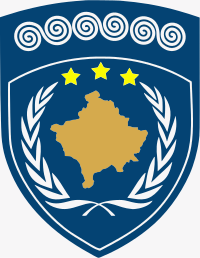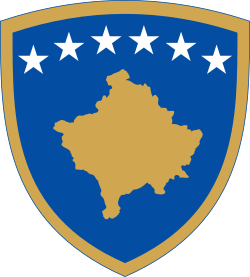Provisional Institutions of Self-Government
The Provisional Institutions of Self-Government in Kosovo (Albanian: Institucionet e përkohshme të vetëqeverisjes, Serbian: Привремене институције самоуправе, Privremene institucije samouprave) or PISG were the local administrative bodies in Kosovo[a] that were established by United Nations Interim Administration Mission in Kosovo (UNMIK).
| Provisional Institutions of Self-Government | |
|---|---|
| Albanian: Institucionet e përkohshme të vetëqeverisjes Serbian: Привремене институције самоуправе, romanized: Privremene institucije samouprave) | |
 | |
| Overview | |
| Established | November 2001 - February 2008 |
| Polity | Kosovo |
| Website | Archived Website |
History
Under the terms of UNSCR 1244 Kosovo came under the administration of the United Nations at the conclusion of Kosovo conflict of 1999. Kosovo is the subject of a long-running political and territorial dispute between the Serbian (and previously, the Yugoslav) government versus Kosovo's largely ethnic-Albanian population.
Resolution 1244 permitted the United Nations to establish and oversee the development of "provisional, democratic self-governing institutions" in Kosovo. The United Nations Administration established an internationally supervised Kosovo Police Service in 1999. A Joint Interim Administrative Structure was established in May 2000. In May 2001, UNMIK promulgated a Constitutional Framework which established these Provisional Institutions of Self-Government (PISG). The first elections for these institutions were held in. Following these elections UNMIK gradually transferred increased administrative competencies to the PISG.
Whilst UNSCR 1244 formerly maintained Kosovo as part of Serbia, international negotiations began in 2006 to determine the final status of Kosovo. Kosovo unilaterally declared independence from UNMIK in 2008.
Structure
The Provisional Institutions comprised:
- The President of Kosovo, elected by the Assembly of Kosovo.
- The Assembly of Kosovo, made up of 120 members of which 10 seats are reserved for ethnic Serbs and 10 for other ethnic minority groups;
- The Government of Kosovo, with a Prime Minister of Kosovo nominated by the President and endorsed by the Assembly;
- The Judicial System of Kosovo, which is appointed by the SRSG from a list endorsed by the Assembly after being proposed by the Judicial and Prosecutorial Council.[1]
See also
Notes
| a. | ^ Kosovo is the subject of a territorial dispute between the Republic of Kosovo and the Republic of Serbia. The Republic of Kosovo unilaterally declared independence on 17 February 2008, but Serbia continues to claim it as part of its own sovereign territory. The two governments began to normalise relations in 2013, as part of the 2013 Brussels Agreement. Kosovo is currently recognized as an independent state by 97 out of the 193 United Nations member states. In total, 112 UN member states recognized Kosovo at some point, of which 15 later withdrew their recognition. |
References
- "UNMIK – Civil Administration". 2008. Archived from the original on 2008-03-11. Retrieved 2008-02-20.
